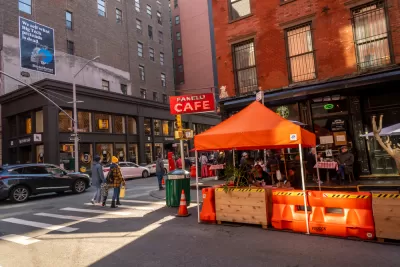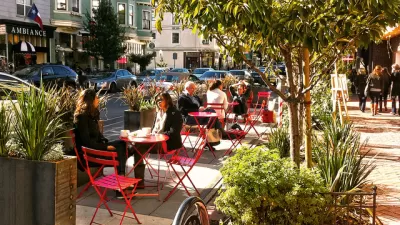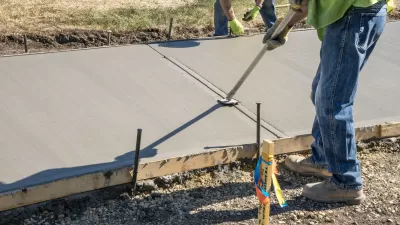The rush to utilize sidewalk space for outdoor seating and parklets has created new obstacles for people with disabilities.

Although the "open streets" movement brought a new sense of freedom to many pedestrians, people with disabilities have found themselves running up against a new set of obstacles. According to Peneliope Richards, a writer with cerebral palsy, "[p]lenty of outdoor dining setups act as sidewalk obstacle courses." As John Surico reports in Bloomberg CityLab, "[n]avigating commercial stretches packed of streateries, parklets and other Covid adaptations has often exacerbated the existing challenges faced by wheelchair users and others with mobility impairments."
While parklets and outdoor seating programs were designed to provide more public space, "as many of these street changes are being made permanent, advocates are fighting to ensure that that space is expanded equitably." Eman Rimawi, an organizer for New York Lawyers for the Public Interest, says cities should be more proactive in enforcing ADA compliance and figuring out where parklets and outdoor seating can go without posing accessibility problems. "On streets with extensive outdoor dining — now made permanent by City Hall — planners should analyze where sidewalks can safely be expanded. The parking-spot parklets, she said, open up the possibility of converting even more street space to pedestrian usage," creating more public space without crowding the city's sidewalks.
Ensuring accessibility also helps increase visibility for people of all abilities, says Alan Benson, a wheelchair user in London. Inclusion, he says "means allowing everyone to participate in urban society, so everyone else notices."
FULL STORY: For Disabled Users, the ‘Open Streets’ of the Pandemic Remain Closed

Planetizen Federal Action Tracker
A weekly monitor of how Trump’s orders and actions are impacting planners and planning in America.

Congressman Proposes Bill to Rename DC Metro “Trump Train”
The Make Autorail Great Again Act would withhold federal funding to the system until the Washington Metropolitan Area Transit Authority (WMATA), rebrands as the Washington Metropolitan Authority for Greater Access (WMAGA).

DARTSpace Platform Streamlines Dallas TOD Application Process
The Dallas transit agency hopes a shorter permitting timeline will boost transit-oriented development around rail stations.

The Tiny, Adorable $7,000 Car Turning Japan Onto EVs
The single seat Mibot charges from a regular plug in about as much time as an iPad, and is about half the price of an average EV.

Supreme Court Ruling in Pipeline Case Guts Federal Environmental Law
The decision limits the scope of a federal law that mandates extensive environmental impact reviews of energy, infrastructure, and transportation projects.

Texas State Bills to Defund Dallas Transit Die
DART would have seen a 30% service cut, $230M annual losses had the bills survived.
Urban Design for Planners 1: Software Tools
This six-course series explores essential urban design concepts using open source software and equips planners with the tools they need to participate fully in the urban design process.
Planning for Universal Design
Learn the tools for implementing Universal Design in planning regulations.
Roanoke Valley-Alleghany Regional Commission
City of Mt Shasta
City of Camden Redevelopment Agency
City of Astoria
Transportation Research & Education Center (TREC) at Portland State University
US High Speed Rail Association
City of Camden Redevelopment Agency
Municipality of Princeton (NJ)





























